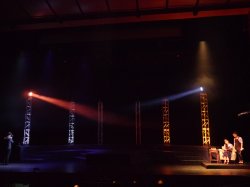Expressing Thanks Through Music
MSU Singers and New Jersey Symphony Orchestra collaborate for virtual performance of Gratias Tibi
Posted in: Cali News

After months of physical isolation and weeks of solitary work, 45 volunteer current and alumni members of the MSU Singers – sopranos, altos, tenors and basses – their director and assistants have produced a collective expressive of thanks and hope, in a virtual performance with the New Jersey Symphony Orchestra (NJSO).
The collaboration centers on a new work, Gratias Tibi, by José Luis Domínguez, that is one of the first-ever commissioned specifically for physically distanced choir and orchestra performance. Gratias Tibi enjoyed its world premiere online Monday, June 22, at 8 p.m.
Gratias Tibi, which means “thanks to you” in Latin, offers a message of thanks to all front line workers who have responded to this unprecedented emergency with bravery and compassion.
But creating a professional quality sound and visual performance isn’t as easy as putting everyone in a Zoom meeting and waving a virtual baton.
“Working with singers is more complicated due to the complexities of rhythmically aligning vowels, placement of initial and final consonants, breathing, phrasing in the first instance,” explains Heather J. Buchanan, Montclair State University Director of Choral Activities. “And we have student choristers who had to learn music without the ability to hear all of the vocal parts simultaneously and in a very limited time frame – less than two weeks.”
To aid the choristers in breathing and hitting their consonants in synchronicity – despite social distancing and solitary recording – Buchanan pioneered a new methodology that involved layering a click track from NJSO with piano accompaniment and breathing cues for each part coached and recorded by John J. Cali School of Music faculty member Steven W. Ryan. The scaffolded coaching/piano/click track was then used by each member of the chorus to individually practice and record their parts, which were then submitted electronically and “stitched” together for the final, professional-quality performance.
Buchanan and Ryan met with the singers for virtual Zoom rehearsals on May 12 to introduce the piece and May 19 to troubleshoot any problems. The sessions ended up being a shared conversation about choir members’ experiences.
On May 12, when Buchanan first shared the score and her score notes with the singers, Ryan also gave them a preview of what the full chorus and orchestra might sound like using an electronic facsimile.
The students began commenting in the Zoom chat and their excitement was palpable.
“ Wow this is really pretty super bombastic and grand . I’m loving it ,” said Aaron Noriega.
From Terralyn Hayes: “This is gonna be beautiful.”
Added Isaiah Bridges-Green: “ I see tears of joy in everyone’s future .”
The students then set about recording their practices and interviewing themselves to document the process, its challenges and its highlights, before recording and submitting their final vocal files.
A quick perusal of the videos shows singers working their way through the score in bedrooms, basements, apartment lofts, in their grandparents’ dining room – with some reporting that they were even practicing in their cars. Students contended with nearby construction, noisy neighbors, car alarms, leaf blowers and siblings. Charmingly, some videos included surprise visitors such as curious cats and one rabbit named Mr. Kibble.
Despite the distractions, all of the singers appear laser-focused on their work.
“When this project came about I think everyone in the choir was so excited to just have the opportunity to still be making beautiful music together but just in a different way,” says Alexa Tammone.
Regarding the challenges, Kylan Hillman points out, “The hardest thing with this is to find the musicality when you don’t get to sing it with the rest of the choir.”
“Choirs aren’t just people singing the same or different notes at the same time, there’s a connection there,” explains Cristina Latino.
“I’m just very grateful for this,” she adds. “It has enhanced for all of us our musicianship and it has opened our eyes to new ways that we can produce music even in these challenging times. If you had asked us six months ago if a virtual choir could work we probably would have said ‘no.’”
“It’s going to impact the audience,” says Mackenzie Conaway, “giving them a moment to reflect to be thankful for what they have and being thankful for the front line workers. My mom works in health care, and this is a really great way to thank her as well.”
Buchanan says she’s grateful that her students had the opportunity to collaborate with the NJSO on such a unique project.
“Service through music is a core value for the MSU choral program, and the message of this composition aligns beautifully for us,” Buchanan says. “We’re all devastated by the loss of our live performances right now, but we’re honored to be part of a meaningful music project that allows us to express our gratitude to the frontline workers and first responders. Their dedication is our inspiration!”
“The COVID-19 shutdown yanked artists across the world off stage without warning,” says Anthony Mazzocchi, director of the John J. Cali School of Music at Montclair State University. “These moments of beauty that rise from an awful situation give me so much hope for our art during an otherwise heartbreaking time.”
“The University always responds to adversity with open minds and hearts,” says Daniel Gurskis, dean of the College of the Arts. “Montclair State is proud to reach outward and partner with NJSO on this groundbreaking effort. This collaboration will provide not only a once-in-a-lifetime experience of learning and performance for our students but also solace and connection at a time when they are sorely needed.”
“There are some situations that require true heroism,” says Domínguez – a frequent NJSO summer parks and family concert conductor, and artistic director of the NJSO Youth Orchestras. “First responders, doctors, nurses and everyone on the front lines – they have the skills and calling and devotion to put themselves in harm’s way. They’re not with their families so that we can be with ours. They are fighting for us, and this hits really close to the heart.”
“We are so proud to premiere this timely, groundbreaking work from José Luis, a member of our NJSO family, with our longtime choral partner, Montclair State University,” says NJSO President & CEO Gabriel van Aalst. “The opportunity to create music in response to this pandemic and sending this message of gratitude to front line workers and first responders is incredibly meaningful to the Orchestra.”
Story by Staff Writer Mary Barr Mann
“MSU Singers: Making of Gratias Tibi” video by Christodoulos Apostolou
You may also like:
